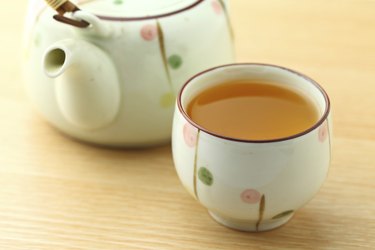
Black tea contains the fermented leaves of the Camellia sinensis plant. When served with hot water it makes a strong tasting brew popular around the world. It may appear that a hot cup of tea could help a condition such as constipation. However, black tea can in fact trigger constipation. Caffeine in the black tea helps contribute to symptoms, so doctors don't recommend drinking black tea when constipated.
Constipation
Video of the Day
Constipation occurs when you find it difficult to pass stools regularly. According to the Children's Hospital of Pittsburgh, if you have fewer than three unforced bowel movements each week then you may be constipated. It can cause a lot of discomfort and even result in torn gut lining if the stool gets too large. In general, drinking lots of fluids can help loosen stools and relieve constipation. However, some drinks, including black tea and alcoholic beverages, can make constipation worse.
Video of the Day
Caffeine
Caffeine acts as a diuretic. That means that it increases the amount of water lost from the body via urination. This can lead to drier stools that are more difficult for the body to pass. Black tea contains between 20 and 110 milligrams of caffeine per cup. As a comparison, instant coffee contains between 30 and 120 milligrams. Drinking lots of black tea throughout the day may lead to feelings of dehydration, particularly if you're urinating frequently.
Treatments
Instead of drinking black tea to relieve constipation, try drinking water or fiber-based juices. Some over-the-counter drugs offer laxative effects that can help to shift compacted stools. In general, eating a diet high in fiber--such as wholegrain breads and vegetables--helps to keep your bowel movement regular. Always consult your doctor before taking medication, particularly if you're pregnant or have any existing medical conditions. Serious constipation that lasts for weeks may signal related health problems. Speak to your physician if your constipation persists.
Considerations
Though traditional black tea may contribute to constipation, you can find decaffeinated black tea in many stores. This offers the taste of tea without the caffeine. Similarly, green tea appears to create less of a constipation risk and contains about one-third of the caffeine of black tea. Black tea offers other health benefits. For example, some studies link tea drinking with lower rates of Parkinson's disease and some cancers. However, as of May 2011, this evidence is inconclusive, according to MedlinePlus.